This is the multi-page printable view of this section. Click here to print.
Quick Start Guide
- 1: Adding a Session
- 2: Attending a Session
- 3: Best Practices
- 4: Change Email or Password
- 5: Changing Speaker Language
- 6: Downloading QR Codes
- 7: Meeting Shortcuts
- 8: How To Start a Session
- 9: Using Wordly Translator App for IOS
1 - Adding a Session
When you first login to Wordly, you’ll automatically start on the Dashboard:
To access the Sessions page:
- Move the mouse cursor to the left side of the screen
- Click on Sessions (
):
Adding a Session
Note
Zoom users will experience a different setup process. Check out these help articles. If you’re using Zoom to add a new session.If you’re using a web browser to log in to Wordly, click + Add Session (  ).
).
This will open up the following menu:
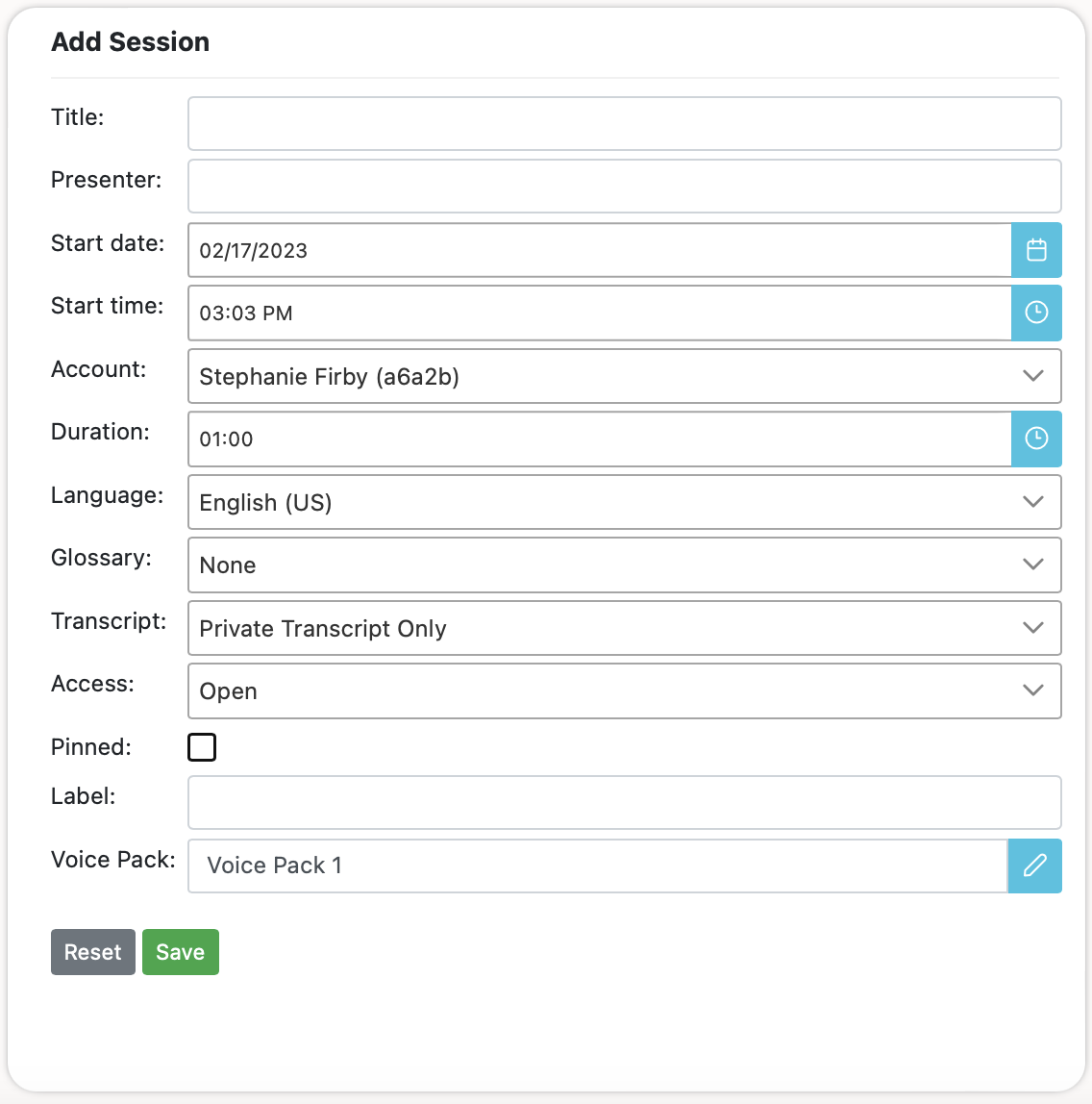
Fill in the following information as it appears:
Title
The name of your session. At the moment, session titles only display within the list of sessions on the left side of the Sessions page, and within exported session transcripts.
Presenter
The name of the person Speaking during the session.
- If the presenter will be using a streaming interface (Zoom, etc), this field will be auto-populated with “Wordly”.
- However, if the presenter uses the Join App or the Wordly mobile app as their audio source, then their actual name will come up.
Start Date
The date the session is planned to start.
Note
If a session doesn’t start within 48 hours after it’s scheduled to begin, it will automatically be removed.Start Time
The time the session is planned to start.
- While it’s required to include a start time, a session isn’t required to begin at the indicated time, as long as it starts within 48 hours after the set time.
Note
The time zone of the session is automatically determined by your browser. If you’re in PST and want to create a session for JST, you’ll need to update your system time/date/location to reflect the time zone you wish to schedule for.Account
The account field will be auto-populated with your account information. If you have multiple accounts or use a shared account, select the account you wish to bill from the dropdown.
Duration
The desired length of the session by hours and minutes. The duration you set will add to your scheduled minutes on the Wordly dashboard.
- 01:00 = 1 hour
- 00:30 = 30 minutes
Note
To learn how minutes are charged by Wordly, check out the Billing Minutes section below.Language
Choose carefully, as the selected language is what Wordly translates from. For example, if the presenter of your session will be speaking French, the chosen language should be set to French, even if the intent is to have Wordly translate it into another language.
- It’s possible to change the language of a session after the session has started, as well as during an active session. Check out this article for instructions.
Glossary
Select a pre-made glossary.
- Only 1 glossary can be used per session.
- Glossary selection can be changed until a session has started. Selecting a different glossary mid-session will not affect the current session.
Transcripts
Transcripts are written/printed versions of all the dialogue spoken during a session. At the moment, transcripts are only available to private accounts, and can’t be shared through Wordly. Choose an option from the dropdown:
- Save No Transcripts - No transcripts will be saved.
- Private - Transcripts will be saved to your account automatically on completion of a session, in the chosen language of the speaker.
- Allow Public Transcripts - Not functional at this time.
Access
Access determines who can attend a session and the security required to enter. There are two options available:
- Open - Anyone with an Attendee Shortcut (see below) can attend the session.
- Require Attendee Passcode - Determines whether or not a passcode is required to join the session. The passcode must be at least 6 characters.
“Pinned” checkbox
Typically, 24 hours after a session begins, it is moved from the Upcoming list to the All list. Checking the Pinned box retains the session in the Upcoming list indefinitely.
When you’re ready to continue, click Save ().
-
To edit an existing session, select it from the list on the left side of the screen, and click the Edit icon (
) in the Session Details box on the right.
-
To delete an existing session, select it from the list on the left side of the screen, and click the trashcan icon (
) in the Session Details box on the right.
Label
Labels allow the user to add a word or phrase to their session so it is easier to search for later.
Voice Pack
Sessions can be assigned a voice pack. A voice pack is a curated list of voices for the Wordly attendee languages.
-
If you do not specify a voice pack when creating a session, then the created session will use the voice pack selected in your Wordly profile. By default, your profile will be set to use the default voice pack, which is currently Voice Pack 1.
-
You can sample the voice packs for different languages when editing a session or updating your profile in the Wordly Portal.
Session Lists
Once your session is saved, it will be visible on the left side of the session screen. The Upcoming list shows sessions scheduled for the future or pinned sessions. Clicking All to the right of Upcoming will show all sessions, past and present.
Sharing the Session
Once you’ve finished adding a session, you’ll be provided with a series of links to send to attendees and presenters.
Attendee shortcuts
Attendee Shortcuts are intended for viewers/listeners only. Please do not get these confused with Meeting Shortcuts (see below), which are intended for speakers/presenters.
-
Share the provided link with anyone you want to attend your sessions. Click the email icon (
) to open your computer’s email client with a pre-populated message containing the provided link.
-
Click the copy icon (
) to copy the provided link to your system’s clipboard.
-
Alternatively, provide the QR code so that anyone with a smartphone can scan it via their camera app. The QR code can be easily printed by clicking the print icon (
).
Meeting shortcuts
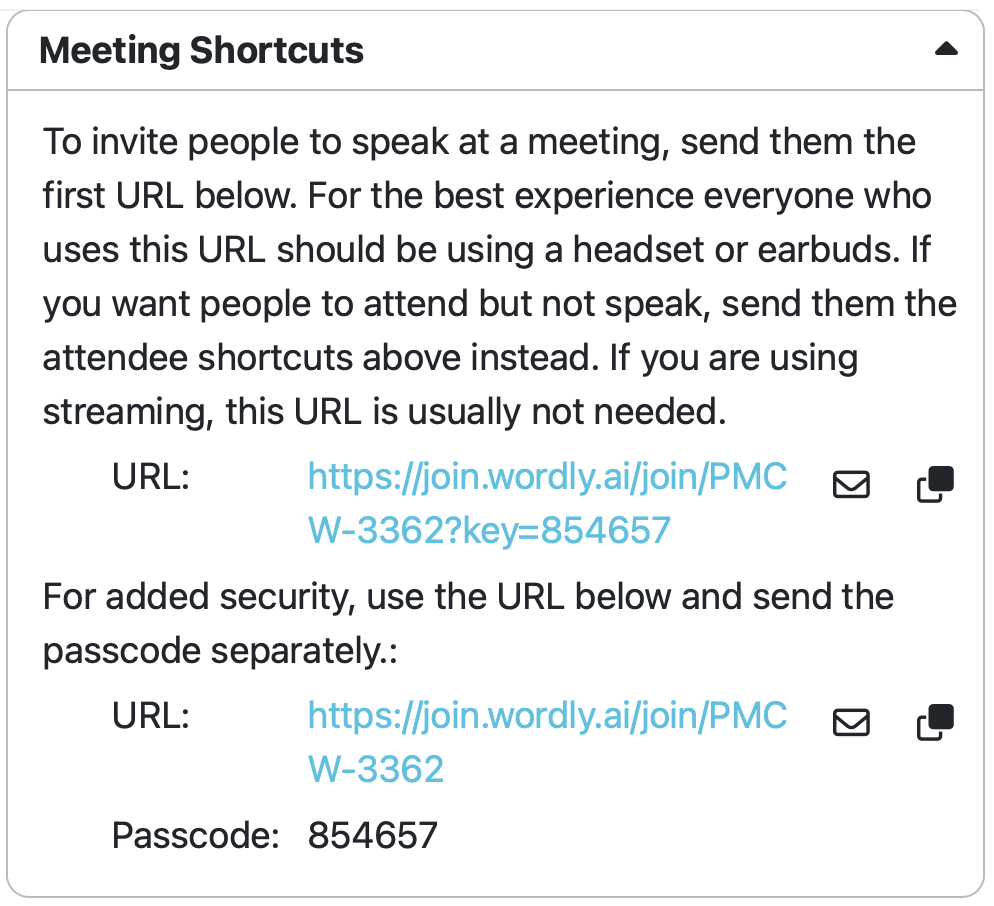
Meeting Shortcuts are intended only for those people who you plan on presenting during this session. It’s important not to get these confused with Attendee Shortcuts (see above), which are intended for viewers/listeners only. Please use Meeting Shortcuts cautiously.
For security purposes, a six-digit passcode is required to access a session as a presenter.
-
For convenience, the top link includes the passcode.
-
For additional security the bottom link will ask for the passcode, which can be provided separately.
Streaming Shortcuts
-
Click the “email” icon to open your computer’s email client with a pre-populated message containing the provided link.
-
Click the “copy” icon to copy the provided info to your system’s clipboard.
Certain services (such as Vimeo) might not work with the information provided in the top-half of the box. If you’re having trouble streaming, try using the alternative links provided at the bottom of the box.
Note
For additional help with streaming through Wordly, check out [this guide.](/develop/rtmp streaming).Billing Minutes
-
Minutes are not charged based on the duration of a session, but actual used minutes.
-
For example, if a session is set for 1 hour but lasts only 37 minutes, only those 37 minutes are charged.
-
Conversely, If a session is set for 1 hour but goes 1 hour 5 minutes, 65 minutes will be charged.
-
-
Minutes stop being charged either when the stream to the session is ended, or when the presenter mutes their microphone.
-
Sessions do not end automatically at the end of the scheduled duration.
-
If you’re streaming, you must end the stream manually to avoid having minutes charged.
-
To prevent the usage of unused minutes, you’ll need to manually** end the session** when finished. Otherwise, Wordly will continue to bill your minutes until either your minutes run out, or the session is ended automatically.
- To prevent minutes being charged accidentally, Wordly will automatically end a session after two hours if no stream is detected.
2 - Attending a Session
Browser
To attend a session in a web browser, you must have first received an Attendee Link.
-
Click the Attendee Link. It should look like this: https://attend.wordly.ai/
-
Once clicked, a Wordly Attend page will automatically open in your default browser:
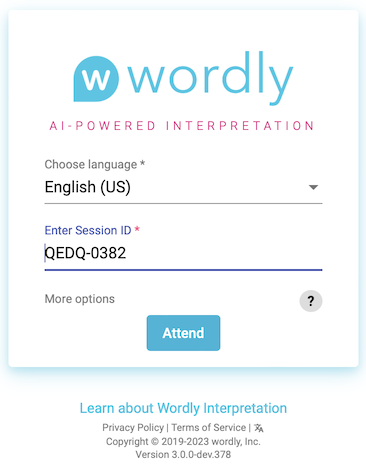
-
Choose the language you want Wordly to translate spoken dialogue into.
- Example: If the speaker is speaking in English and you want to translate into French, select French.
-
If it’s not already filled in, enter the Session ID.
-
The Session ID is always four-letters and four numbers.
-
If not provided to you, you can sometimes find the Session ID at the end of the Attendee Link you were sent.
- Example : https://attend.wordly.ai/join/RNBR-7474
-
-
When ready, click the Attend button (
 ) to start.
) to start. -
When finished, close the browser, the tab, or click the exit button (
 ) to leave the session.
) to leave the session.
For additional settings options, read the Attending Additional Options article
Mobile browser
To attend a session on a mobile device’s web browser, you’ll need an Attendee Link or QR code to scan.
Attendee link
Attendee links are typically sent through email or text message.
-
Tap the Attendee Link. This will automatically open Wordly in your device’s default browser:
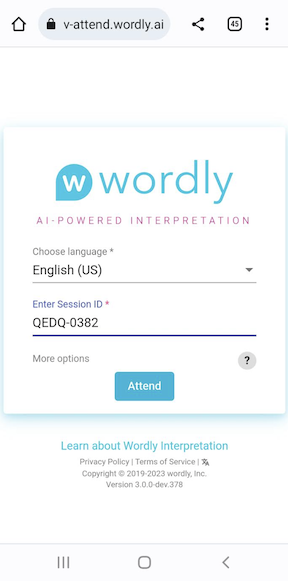
-
Tap on the language dropdown to choose the language you want Wordly to translate spoken dialogue into.
- Example: If the speaker is speaking in English and you want to translate into French, select French.
-
If it’s not already filled in, enter the Session ID number.
-
The Session ID is always four-letters and four numbers.
-
If not provided to you, you can sometimes find the Session ID at the end of the Attendee Link you were sent.
-
Example : https://attend.wordly.ai/join/RNBR-7474
-
-
When ready, tap the Attend button (
 ) to start.
) to start. -
When finished, close the browser, the tab, or click the exit button (
 ) to leave the session.
) to leave the session.
QR codes
Follow these steps to attend a Wordly session through a QR Code:
-
Use your mobile device’s camera or barcode scanning app to scan the QR code, which will appear similar to this:
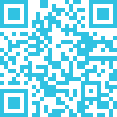
The Wordly Attend window will automatically open in your device’s default browser:

-
Tap on the language dropdown to choose the language you want Wordly to translate spoken dialogue into.
- Example: If the speaker is speaking in English and you want to translate into French, select French.
-
If it’s not already filled in, enter the Session ID number.
-
The Session ID is always four-letters and four numbers.
-
If not explicitly provided to you, you can sometimes find the Session ID at the end of the Attendee Link you were sent.
-
Example : https://attend.wordly.ai/join/RNBR-7474
-
-
When ready, tap the Attend button (
 ) to start.
) to start. -
When finished, close the browser, the tab, or click the exit button (
 ) to leave the session.
) to leave the session.
Wordly App
There are two ways to attend a session in the IOS Wordly App:
- Enter the Session ID (and passcode if required)
- If signed in, you can select your session and click the green “start” button at the bottom of the screen.
Read more about the Wordly App.
3 - Best Practices
Audio Tips
We suggest using high-fidelity audio equipment such as headsets, headphones, earbuds, or boom microphones, preferably with noise-canceling technology.
Advise your presenters to avoid using integrated laptop microphones, which capture too much background noise. If a laptop microphone is the only option available, we suggest turning the microphone gain levels up as high as possible in their laptop system’s audio settings.
Coach your speakers
-
If you have multiple presenters, make sure they know to speak one-at-a-time and avoid interrupting or speaking over each other.
-
Presenters should know to enunciate clearly.
-
Avoid using music with lyrics.
-
Presenters should speak at a moderate pace, pausing between sentences briefly.
-
Advise your presenters to pick a single language to speak in.
-
Make sure your presenters have sufficient bandwidth to support high-quality audio capture.
Create Glossaries
-
Glossaries are custom libraries which significantly increase the accuracy of Wordly’s transcription results. Without a glossary for reference, Worldly may be unable to properly transcribe unique phrases, words, and terminology that may be specific to your organization, employees, or departments. Check out this article to learn how to create glossaries.
-
Make sure to create glossaries for all the languages which presenters will be speaking.
Set Practical Expectations
Many variables can affect the accuracy of Wordly’s translation, including available internet bandwidth and possible issues with hardware, software, and operating systems. Make sure to let your presenters know that while they should expect a great experience with Wordly, errors are possible.
4 - Change Email or Password
Follow these steps to change the email and/or password associated with your Wordly account.
- In your Wordly account, click on your profile button located on the upper right of the screen.
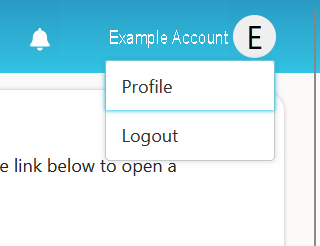
- Click on “profile” to view profile details. At the bottom, click on the blue “Manage email and password” link.
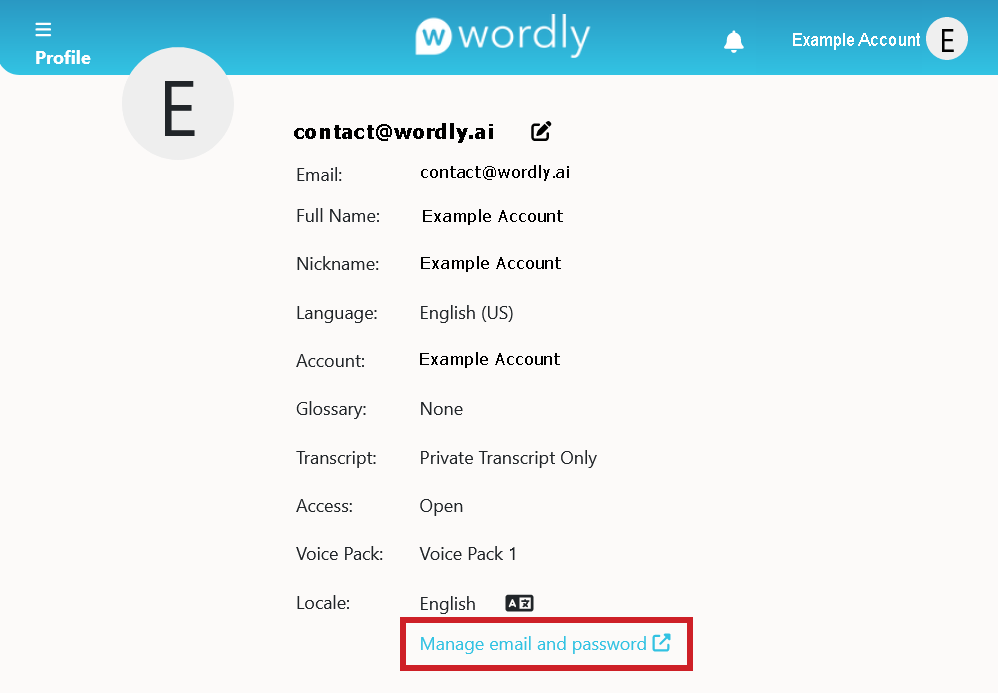
Wordly will automatically open to “Personal info”; however, two other options will be available on the side bar: “Account security” and “Applications”. This article covers Personal info and “Signing in” under Account security.
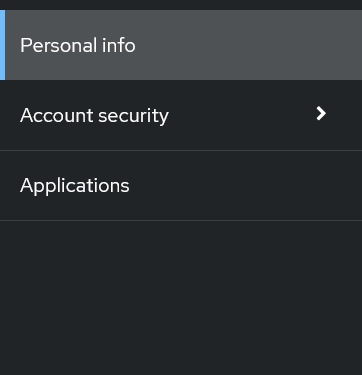
-
In Personal info, click inside the boxes to update account name and email.
-
Use the dropdown menu to select locale.
-
Click the blue Save button at the bottom to save your changes.
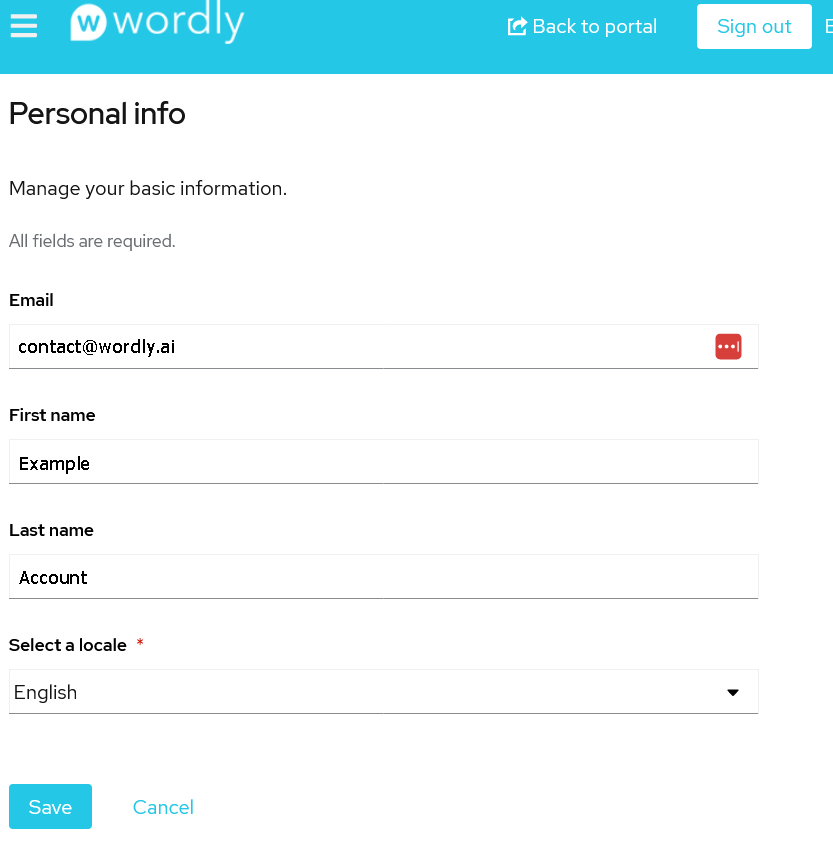
- On the sidebar (if you do not see it, select the three horizonal lines button on the upper left), click “Account security” to show more options.
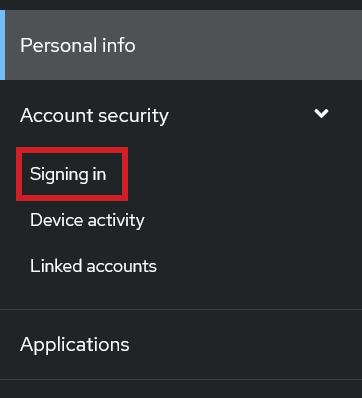
-
Click “Signing in”
-
To update your password, click the Update button. If you have always used a separate Single Sign On service like Google, Apple, or a corporate login, this option will not be available. You will have to change your password via that service.
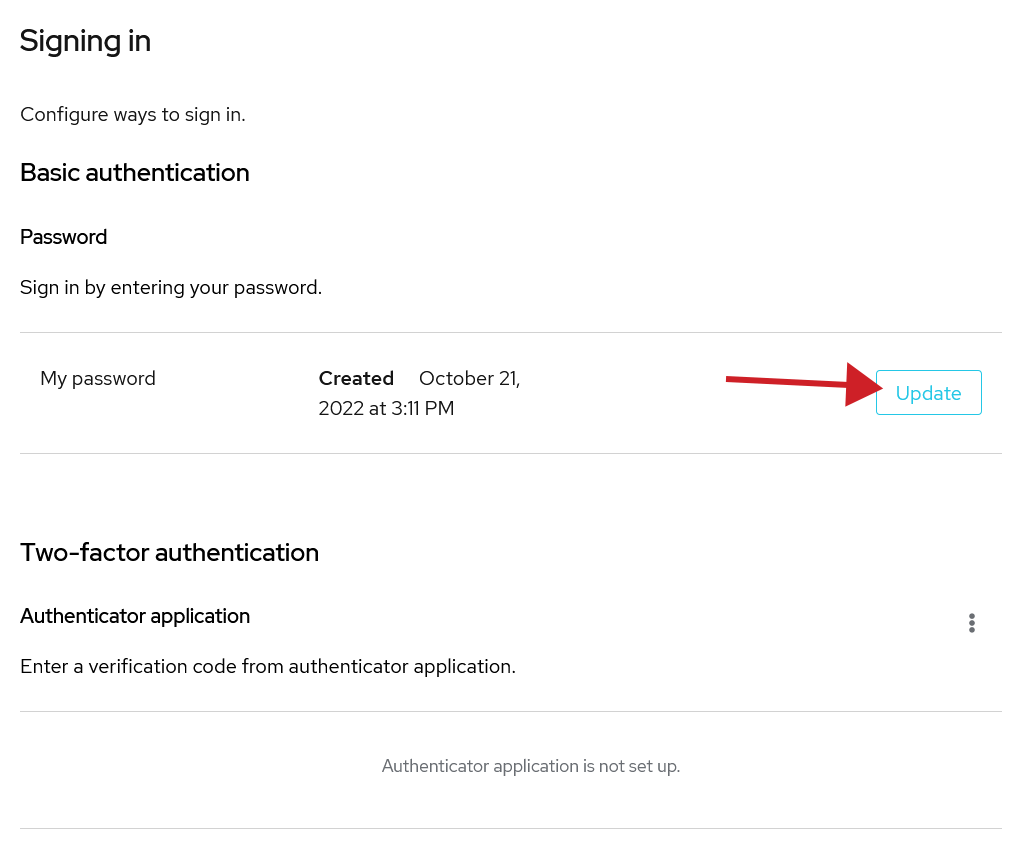
-
Click Update. You will be asked to verify your identify by entering your old password. After verification you will be taken to the Update Password screen where you can enter your new password.
-
Enter your new password and then confirm the new password. You can check the “Sign out from other devices” option to force other devices using your account to sign in using the new password.
-
Press “Submit” to save your new password.
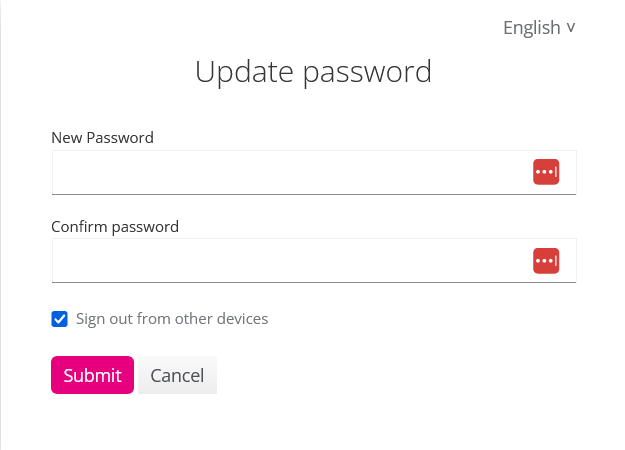
- On the Signing in page, you can also set up two-factor authentification through an authenticator application by clicking the vertical three-dot icon and clicking “Set up authenticator application”.
5 - Changing Speaker Language
Wordly supports multilingual speaking. This looks different whether you are using the Wordly Join App or using Wordly Meeting Bot.
Wordly Join App
In the Wordly Join App (accessed through Meeting Shortcuts), you can choose any language at any time, but to quickly switch between two languages, click the down arrow to reveal more language options.

One language will be labeled “speak/talk” while the other is in a gray font and labeled “paused”.
Choose your desired languages to switch between using the drop down menus. Changing the “speak/talk” language will immediately change the speaker language while changing the “paused” language selects a new language for fast switching via the arrows icon.
Click the arrows icon to switch the speak/talk language to paused and vice versa.

Wordly Meeting Bot
On your Wordly account, go to the Sessions page and select the gear icon that appears when a session is live.
A pop-up window (the same one used to invite the Meeting Bot) titled with the Session ID and “Live Session Controls” will appear with two options: End Session and Active Meeeting Bot.
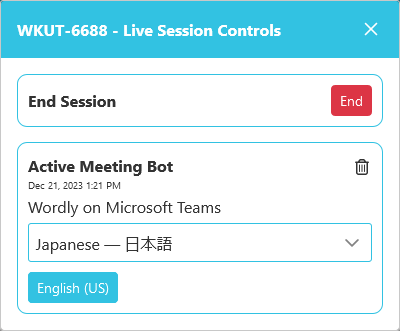
Under Active Meeting Bot, there will be the option to select the language of the speaker. Selecting a new language immediately changes the speaker language.
For each new language selected, a blue button of the previous selected language will appear underneath the language dropdown menu. Click the buttons to switch back and forth between speaker languages. The current speaker language is always the one selected in the dropdown menu.
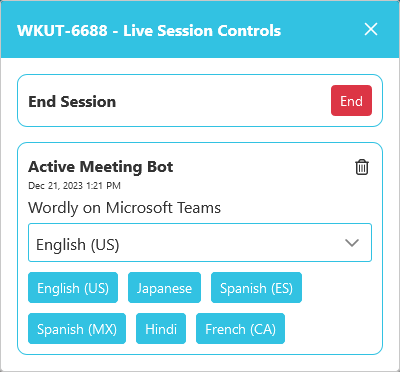
Select as many languages as needed. If the X at the upper right of the popup is pressed, the window will close, but your selections will be saved.
6 - Downloading QR Codes
Wordly offers QR codes as a quick and simple way to join a session. These QR codes can be downloaded in multiple formats for ease of use at meetings and conferences.
To download a QR code
- From the Wordly dashboard, select Sessions from the left side menu.
- Select your target session.
- Click Attendee Shortcuts to expand the window and reveal the URL and QR code. To the right of the QR code, click the download button (
 ).
).
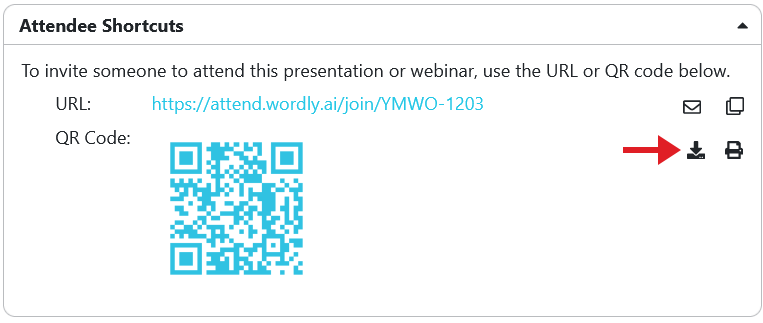
- A new window displays the following download formats. This file format can be:
- On-screen scaleable (SVG) - Added to websites or displayed on a screen. You can enlarge the QR code without loss of quality.
- SVG with passcode embedded - Added to websites or displayed on a screen with an attendee passcode built in. This option is only available if the created session needs a passcode to access.
- Printable (PDF) - Printed and distributed to attendees. You can also display this QR code on a screen.
- PDF with passcode embedded - Printed and distributed to attendees. This option is only available if the created session needs a passcode to access.
- Instructions included (PDF) - Printed and distributed to attendees.
The QR code downloads as a .zip file. Inside is a folder labeled session_qr_codes, which contains a PDF with your QR code in your chosen format.
Note
You can also select the QR code and drag it onto your desktop. This copies the QR code to you desktop. You can also right-click the QR code to save itYou can download multiple sessions’ QR codes at once.
To download multiple QR codes
- In the Sessions tab, select the sessions that you want to download.
- Click Download Sessions.
- Select the QR format that you want to download.
Note
When you select Instructions included (PDF), sessions that require a passcode won’t be included because they require the user to take additional steps to attend.7 - Meeting Shortcuts
In Sessions (), select your desired session and click Meeting Shortcuts (below Attendee Shortcuts).
Using the first URL under Meeting Shortcuts, join the Wordly session. Be sure to allow your browser to access your microphone. Remember that if you want people to attend but not speak, send them the attendee shortcuts link instead.
Wordly will translate your speech and the text you see into the selected language (shown next to the microphone icon). Changing the language in “talk/listen” will change the language into which Wordly’s speech recognition translates and transcribes for you. Others’ translation settings will not be affected.

Wordly works best when enunciating clearly. You can use Glossaries to allow Wordly’s speech recognition to include unique terminology.
Bilingual Mode
Meeting Shortcuts also allows the user to switch quickly between two languages. Pressing the down arrow to the right of the End Session icon will bring up talk/listen.

The language selected in “talk/listen” should be the language you are speaking in. It will also be the language Wordly will translate into. The language selected in “paused” is, essentially, waiting in the wings. Wordly’s real-time translation will not appear in that language until you click the switch button (the icon of arrows pointing in opposite directions).
Once clicked, the language in “paused” will become the “talk/listen” language and the previous “talk/listen” language will be paused. You can switch back and forth ad infinitum.
Audio Settings
To change your microphone in a session, you will need to go to settings.
First, click the vertical elipses in the upper righthand corner.

Click on Settings to open the dialog box.
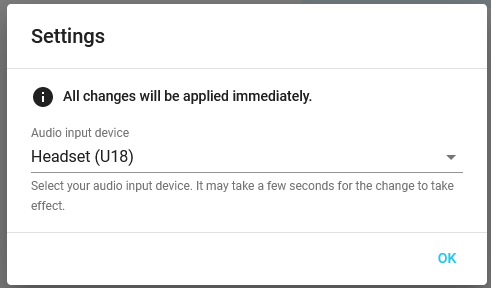
From there, you can click the dropdown menu to select your audio input device (microphone/headset).
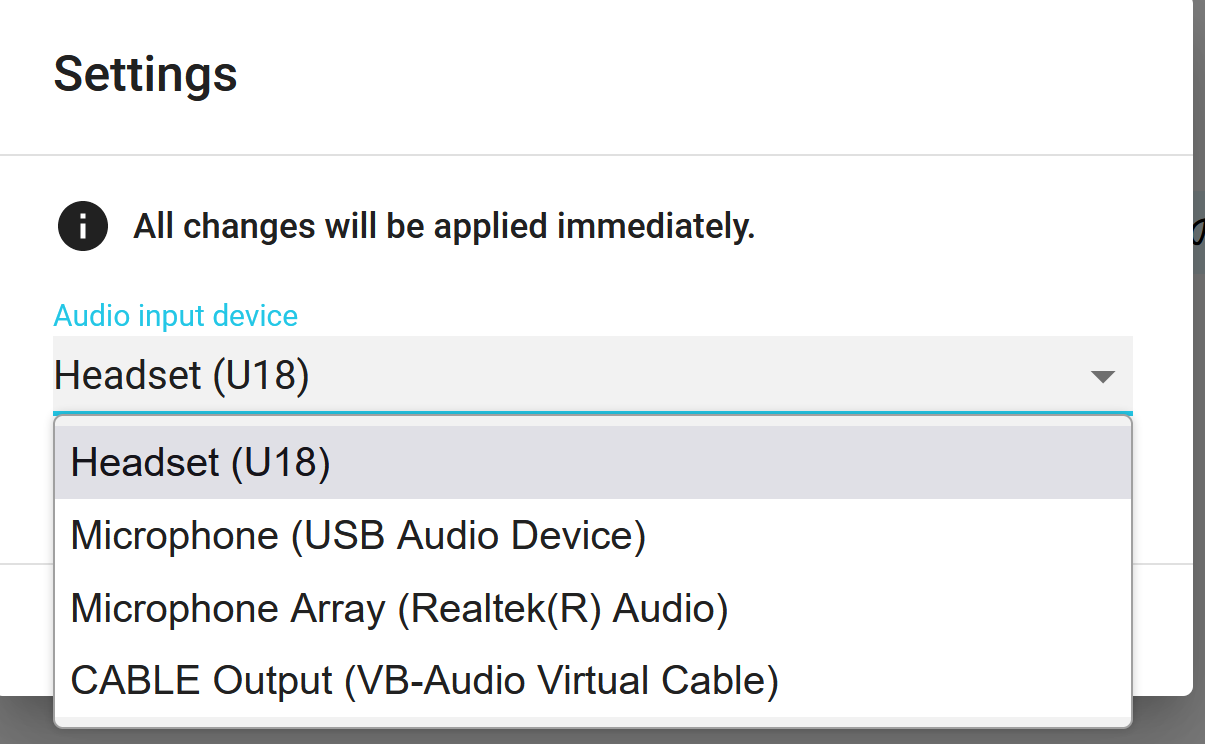
Click “OK” to close the dialog box.
Identifying Multiple Speakers
If there will be multiple speakers in a session, Meeting Shortcuts can be used to identify each person.
After clicking the Meeting Shortcuts link, type your/the speaker’s name into the box under Enter Name.
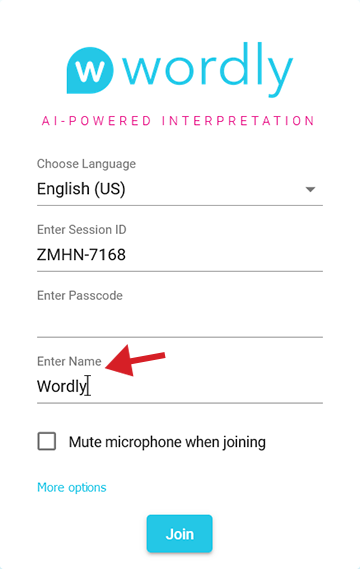
Wordly will then identify your/the speaker’s words for others in the session.
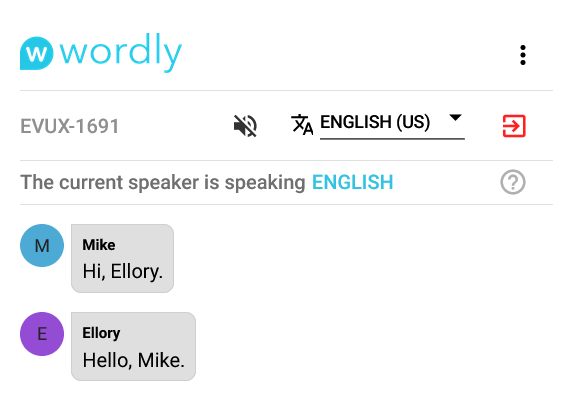
Push-To-Talk
The Push to Talk feature allows speakers to unmute themselves by holding down the microphone button. Push to Talk is not on by default. To turn on Push to Talk, follow the instructions below:
-
After opening your session, click on the settings button (
 ) in the upper right corner.
) in the upper right corner. -
Scroll down to “Input Mode”.
-
Click “Push to Talk”.
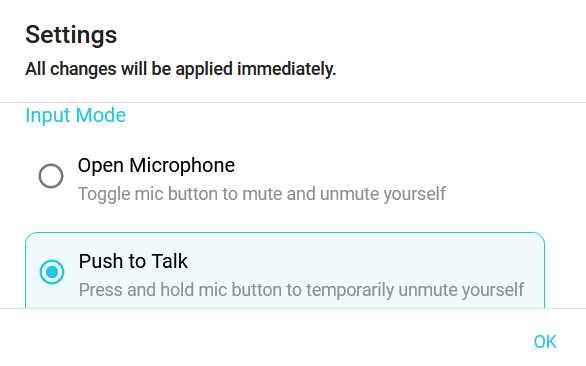
- Press “OK” to close the settings window.
Now the microphone button ( ) will appear red
) will appear red  .
.
When you press down the button (or hold your hotkey), the mic will unmute and you will see the button’s white circle will fill with pink  .
.
After you push the mic button, it will take a second before your words pick up on the transcription. Please note that the Join app (your session webpage) must be in focus for this to work. If the window is minimized or if you are in another tab or window, Push to Talk will not work.
Changing Hotkey
By default, Push to Talk is activated by holding down the space bar. To use a different key on your keyboard:
- Go to settings (
 ) and scroll down to below “Push to Talk”.
) and scroll down to below “Push to Talk”.
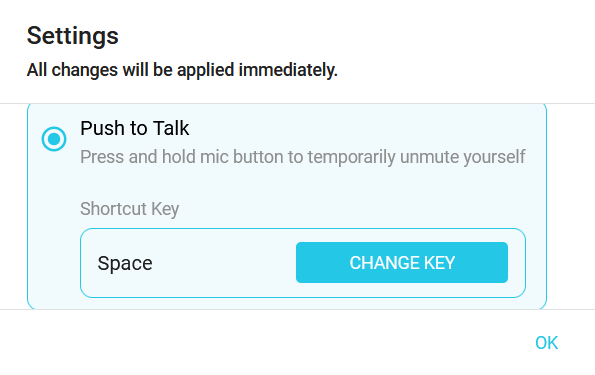
- Press “Change Key”
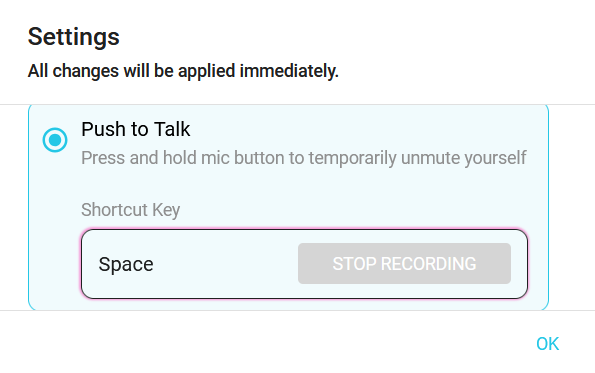
- Then press whatever key on your keyboard you prefer. The change will be automatically updated. Press “OK” to close the settings window.
8 - How To Start a Session
There are a wide variety of ways to start a Wordly session.
In Person Events
Laptop
For speakers, in your Wordly account, click “Meeting Shortcuts”. Click the first URL under Meeting Shortcuts then click join. For attendees, follow the Attendee link to join the Wordly Session.
Anyone using a Meeting Shortcut link will start the Wordly session. It doesn’t have to start in the Wordly Portal.
Android/IOS Device
Download Wordly’s app on Google Play or Apple Store:
Once you have the app, join a session with or without logging in.
Virtual Events
CVENT
There are different versions of Cvent. Contact Wordly to make sure you’re using the appropriate steps for your version of Cvent.
To integrate the Wordly App into your Cvent session, follow the Cvent Widget article.
Zoom
As the Zoom host, use the apps button at the bottom of your Zoom screen, select the Wordly App, confirm your language, and, if desired, specify a Session ID.
Teams
On the Session page of your Wordly Portal, click “Join with Meeting Bot” to invite the bot to your Teams meeting. Wordly will start translating once the Teams host admits Wordly into the call.
Google Meet
On the Session page of your Wordly Portal, click “Join with Meeting Bot” to invite the bot to your Google Meet call. Wordly will start translating once the Google Meet host admits Wordly into the meeting.
Webex
Create a Wordly session then enable other streaming services in Webex. When you start your meeting or Webinar, start live streaming with Wordly using the information found in the Webex Support and Wordly article.
Streaming Generally
Starting an RTMPS stream to Wordly will start your Wordly session.
9 - Using Wordly Translator App for IOS
Getting Started
Download the App
Download the Wordly Translator app in the Apple Store
Open the App
When you first open the app, you will be asked to approve the terms of service. From there, you will be taken to the dashboard where you can join a session or sign into your Wordly account.
Click Sign In, which will bring you to the Welcome page.
Press Sign In with Wordly. If you use your company SSO with Wordly, you should pick your SSO provider. This is the same process as the first time you logged into the portal using your company SSO.
Using the App
Sign In or Join a Session
Whether you have an account of not, you can use the front page of the app to join a Wordly session as either attendee or presenter!
On the front page you can add a Session ID and then the “Join” button will be enabled. Clicking it will connect you to the session as an Attendee. Enter a passcode before clicking “Join” will connect you to the session as a presenter, allowing your speech to be added to the session’s transcript.
Click “Manage” after entering the passcode to change the Presenter’s language and name for the session before starting it.
If you join a session, skip to Attending a Session for more guidance.
Also on the front page is the Sign In option. Click this to sign in to your Wordly account.
After signing in, you will have access to your Wordly Account and see your upcoming/current sessions.
Attending a Session
To attend a session, either enter the Session ID (and passcode if required), or select your session and click the green “start” button at the bottom of the screen.
In the session screen, you will see the live translation. At the top and bottom of the screen will be different settings:
- Language selection
- Microphone
- Leave or End Session
- Mute/Unmute button
- View participants
Language Selection
When you click the language listed in the top left of the session, a dropdown menu will appear, allowing you to pick any of Wordly’s supported languages.
For each language you select, quick access buttons will appear at the top of the translation.
Ending a Session
To leave or end a session, click the “END” button at the bottom left. This will bring up a window asking if you would like to leave the session.
- Hit “CANCEL” to return to the session.
- Hit “LEAVE” to exit the session.
- Hit “END” to end the session.
Creating a Session
If you would like to use the app to create a session, click the blue “Add Session” button at the bottom of the screen. This will bring up the Session Setup window.
Here, you can name your session; name the presenter; schedule the date and start time; select duration, language, glossary (if any); choose your transcript preferences; and decide the access level for your new session.
When you are done, hit “Save” at the bottom of the screen, and the session will appear on your list of sessions. You can edit the session after creating it. This session will also be available in the web portal.
Hitting “Back” will return you to the app’s homescreen.